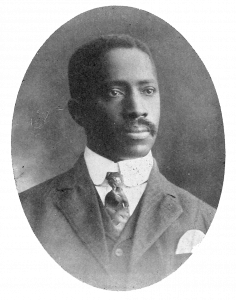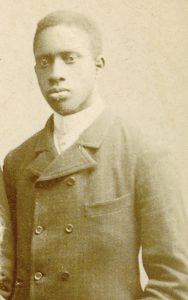Otterbein’s First Black Graduate William Henry Fouse ’1893 In His Own Words.
 Otterbein University’s first Black graduate, William Henry Fouse, class of 1893, was a teacher, a principal, a lifelong learner, a musician, and an inspiration to students and educators in his 45 years of work in public education. On the 130th anniversary of his graduation from Otterbein, there is no one better to tell his story than Fouse himself.
Otterbein University’s first Black graduate, William Henry Fouse, class of 1893, was a teacher, a principal, a lifelong learner, a musician, and an inspiration to students and educators in his 45 years of work in public education. On the 130th anniversary of his graduation from Otterbein, there is no one better to tell his story than Fouse himself.
In 1927, Fouse wrote to Mrs. George Alexander of Westerville, thanking her for an invitation to the Westerville High School Golden Anniversary. He wrote:
“I will not be garrulous but I must say that I was born in your beautiful town 59 years ago, son of two slaves who came to Ohio from bondage and never were able to read or write. They gave 27 years of their lives without recompense. I was born in a log cabin a mile or so from Westerville.”
 Fouse’s family later purchased a house on Home Street, where William and his two brothers were raised. In 1889 his father, Squire, purchased a home that had been owned by William Hanby and had it moved to a plot of land on Home Street, where the Campus Center is today. In an article written for the Westerville Public Opinion in 1938, Fouse wrote:
Fouse’s family later purchased a house on Home Street, where William and his two brothers were raised. In 1889 his father, Squire, purchased a home that had been owned by William Hanby and had it moved to a plot of land on Home Street, where the Campus Center is today. In an article written for the Westerville Public Opinion in 1938, Fouse wrote:
“Three interests dominated the life of Squire Fouse. They were a home, the education of his children, and his church. If he could speak now, (he) would say that the spirit and literary gifts of Ben Hanby had been infused into his own son, and that he, though a slave for many years, had made the correct appraisal of the magic and power of education.”
Fouse was the first Black graduate of both Westerville High School and Otterbein University.
According to Otterbein historian Harold Hancock, “[Fouse] taught school in Indiana, Ohio, and Kentucky, serving as principal of Dunbar School in Lexington, KY, for 24 years. In Kentucky he organized the Bluegrass Oratorical Association and Bluegrass Athletic Association, instituted the Penny Saving Bank Plan in schools, and guided the development of Dunbar School into a modern school. He became president of the Kentucky National Education Association [in 1937]. Just before he retired in 1937, he received an M.A. from the University of Cincinnati.”
That same year, Otterbein gave him the honorary degree, Doctor of Pedagogy.
William Henry Fouse died on June 1, 1944. His work continues to bear fruit today in the schools of Lexington, KY, where he worked for a quarter of a century, and in his hometown of Westerville, where an elementary school bears his name, and his alma mater hosts The William Henry Fouse House of Black Culture. In addition, he continues to inspire us over a century later through his writings.
Henry William Fouse wrote of his father, Squire Fouse:



